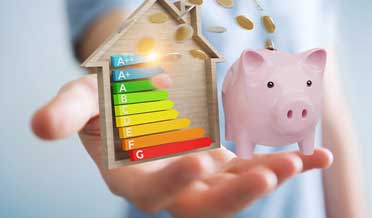Energy Efficient HVAC Tips for Homeowners
The cooling season is upon us! Anticipate that your air conditioner will run frequently until it begins to cool down a little in September and October. Air conditioning makes summer living in the South bearable. However, air conditioning comes with a price tag. Keeping the cost of air conditioning as low as possible is the responsibility of the homeowner. Since performance, efficiency, and cost are related, here is some information that might help you with air conditioning costs.
Energy Efficient HVAC Tip 1: SEER Ratings
In the late ‘80s, researchers developed a rating system for air conditioners called seasonal energy efficiency ratio or SEERS. The rating system began to be applied to new systems in 1992 and the U.S. Environmental Protection Agency began requiring manufacturers to provide systems with increased energy efficiency to benefit homeowners and the environment. Regulations step up the energy efficiency requirements gradually; air conditioners sold in Texas in 2023 and beyond must have a SEER 15 rating or higher.
Ratings for furnaces/heaters use a unit of measurement called the British Thermal Unit or BTUs. BTUs are the result of an equation that defines how much energy is needed to heat a given space. Think of it as a snapshot of heating efficiency. The S in SEER stands for seasonal; the SEER rating takes into consideration that it is easier/more energy-efficient to cool a space when the outside temperature is 790 than when it is 990. The SEER rating compiles the BTU equation and gives an average efficiency rating over an entire cooling season. Think of it as a video. The higher the SEER rating, the more energy-efficient the air conditioner is.
Energy Efficient HVAC Tip 2: Performance Indicators
While the SEER rating is the efficiency starting point, over time, energy efficiency can fluctuate. When air conditioners lose efficiency, there are some telltale signs that homeowners should notice.
- Performance will decline over time, due to simple wear and tear on equipment components. Air conditioners generally have a lifespan in the range of 15 to 20 years; there are steps you can take to prolong useful life listed below. Being aware of the age of your air conditioning system is very important.
- Utility Bills. As performance wanes, the amount of energy required increases. Sometimes the utility bill goes up because energy prices go up. When the utility bill rises WITHOUT an increase in energy costs, take note.
- Your air conditioner should clean the air, cool the air, and remove humidity from the air. If your home is warmer than it should be, surfaces develop a “sticky” feel, or the air smells musty or unusual, these are indicators that the air conditioner is losing efficiency.
Energy Efficient HVAC Tip 3: Performance Boosters from the Homeowner
There are things you can do regularly to increase the energy efficiency of your air conditioner:
- Make sure that your home is properly insulated and weatherproof. Add attic insulation, if needed. Caulk around doors and windows. Even small improvements reduce stress on your system.
- Air Filter. (You hear this so often.) A clogged air filter reduces airflow and makes your system work harder. This costs money and increases wear on components. A new filter should be installed at least every three months.
- Mown grass and blowing dust clog the small spaces in your outdoor AC unit, the condenser. Use a garden hose and wash away the debris that has collected on the fins and coil.
- Learn to program your thermostat for energy efficiency. Reduce the energy demand overnight, while everyone is sleeping, or during the day, while the house is vacant. Smart thermostats may have an efficiency tracker that will help you determine when efficiency begins to slip.
Energy Efficient HVAC Tip 4: Performance Boosters from Professionals
There are things air conditioning technicians can do regularly to increase the energy efficiency of your air conditioner.
- Preventative Maintenance. A technician should inspect and clean your system annually. This will include cleaning areas that are hard to reach and testing electrical switches, sensors, and controllers. Coolant pressure will be tested. If the pressure is inadequate, the tech will check for a leak and add coolant as necessary.
- A technician with a history and knowledge of your system is a distinct advantage when it comes to efficiency. Anticipate advice about a small repair early to prevent a large replacement in the future.
When the time comes for your air conditioner to be replaced, having an air conditioning professional on hand for information, advice, quotes, and continued service is very beneficial.
Would you like to know more about Energy Efficient HVAC Systems?
Let us help with maintaining an Energy Efficient HVAC for your home. Call Doctor Cool & Professor Heat today at 281-338-8751 or email Doctor Cool and let our professional Residential HVAC Replacement technicians assist with all of your HVAC System Spring Cleaning questions.
